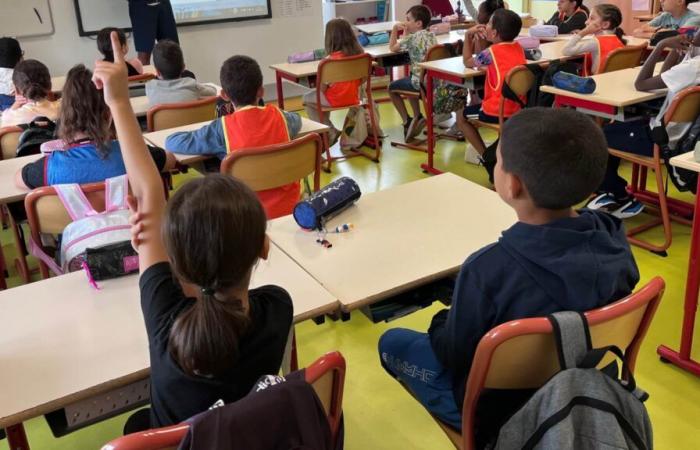It's the little sentence that doesn't get across. “The students of Seine-Saint-Denis benefit from a supervision rate that would make many establishments elsewhere in France green with envy“, launched Anne Genetet during her hearing last Tuesday in the Senate, following her appointment as new Minister of National Education in the government of Michel Barnier.
Lack of education staff
Anne Genetet responded to Ahmed Laouedj, senator (PRG) of Seine-Saint-Denis, who questioned her specifically about the lack of education personnel. “Since January 2024, four Ministers of National Education have succeeded one another (…). Among the departments which suffer the most from this abandonment is unfortunately Seine-Saint-Denis which seems to be the aggregator of the difficulties existing everywhere else in France. Lack of resources, insufficient replacements, unsanitary buildings (…). The inequalities are indisputable: the State invests 2,000 euros less per student in Seine-Saint-Denis compared to the rest of France“, pointed out the parliamentarian before recalling that “parents, unions, municipalities” have been calling for an emergency plan since the start of the year. Although he noted an improvement in terms of unreplaced absences, Ahmed Laouedj highlighted the persistence of the lack of educational staff and the insufficient allocation of students. He also took the collapse of the ceiling of the Roger Martin du Gard college in Épinay-sur-Seine as an example of the degradation of buildings.
200 million euros per year for Seine-Saint-Denis
In her response, Anne Genetet recognized that Seine-Saint-Denis knows “the highest concentration of priority education networks, the greatest social homogeneity… It is perhaps the place where social diversity is the least significant of all the departments of France“, she observed. But, she also recalled the efforts made by the State. “Since 2017, we have put 1,500 FTEs [équivalent temps plein] additional teachers. It is a department which has greatly benefited from the division of classes into large sections, CP, CE1. We put international sections (…) We also revitalized boarding schools. All that still amounts to 200 million euros per year that we have put into the department. We have the loyalty bonus for our teachers which is regularly distributed. We have 26,000 agents who have benefited from it and it will have to be continued. Teaching in a department of this type provides additional expertise that we also give to our teachers. I want to emphasize that the State is truly present alongside the department of Seine-Saint-Denis. We don't let go“, added the minister, before slipping in her remark on the student supervision rate.
“It's a denial of reality“
Enough to provoke reactions from all sides. “No, Madam Minister, the students of Seine-Saint-Denis do not benefit from an enviable supervision rate. With, among other things, 45% of positions open at the CRPE [concours de recrutement de professeurs des écoles] in the unfilled 1st level, a massive use of contract workers, overcrowded classes, thousands of missing supporters of students with disabilities, the reality is very different. If teachers and parents have been mobilizing for months in our department, it is to finally obtain real equality for education in our department.“, retorts Adel Ziane, senator (PS) of the department, on X. “It's a denial of reality“, protests senator (PCF) Fabien Gay who recalls that the former Prime Minister, Edouard Philippe, recognized these inequalities by launching the plan in 2019 “A strong state in Seine-Saint-Denis” to make up for the delay in public services in this area. The deputy for the 5th district (Drancy, Bobigny), Aly Diouara, wrote a letter to the minister to remind her of the precariousness of educational inclusion in the department.
Battle of numbers
Same indignation from the unions. “Every day in 93, the poorest department in mainland France, the state is at fault. It's documented. The emergency plan is 358 million euros. The minister's only priority: Provocation, provocation, provocation!“, reacts Snes-FSU 93.
According to official figures, Seine-Saint-Denis benefits from class numbers below the academic and national average.
| Numbers per class of 1st level schools (public/private, nursery/elementary) | Seine-Saint-Denis | Créteil Academy | Paris Academy | National average |
| 2023 | 20,005 | 21,45 | 20,83 | 21,45 |
| 2022 | 20,16 | 21,67 | 20,80 | 21,62 |
| 2021 | 20,34 | 21,82 | 21,29 | 21,82 |
In detail, the data communicated by the Créteil rectorate indicate (for the start of the 2023 school year) an average number of students of 20.7 in kindergarten in Seine-Saint-Denis compared to 22.2 in the academy (23.5 in Val-de-Marne) and 19.8 in elementary compared to 21.4 in the academy (21.8 in Val-de-Marne). Same observation in colleges: the average number of students per training (excluding Segpa) is 24 in Seine-Saint-Denis, compared to 25.2 on the academic scale and even 26 in Val-de-Marne. Same in high school (see the very official diagram below).
© Rectorate of Créteil
In their report on the follow-up to the evaluation of State action in Seine-Saint-Denis, the deputies Stéphane Peu (PCF) and Christine Descodts (Renaissance)*, had also noted a improvement. “In primary education, the average student ratio increased from 23.4 students at the start of the 2017 school year to 20.2 students at the start of the 2022 school year. Thanks to the doubling of classes, Seine-Saint-Denis is above the national average: the department went from 5.75 teachers per 100 students at the start of the 2017 school year to 6.56 teachers per 100 students at the start of the 2023 school year“, they note. But the report also specifies that “it would nevertheless be interesting to know the rate of supervision outside the priority education network.”
Out of 898 public and private primary schools, 301 are in Rep (priority education network) and 207 in Rep + in Seine-Saint-Denis, which explains the lower average rate. Elsa Foucraut, ethics consultant and trainer, made the calculations, taking these categories into account, and drew different conclusions, which she published on X.
“If we look at the average number per class in all departments of France, Seine St Denis is in 94th national position (for the 2020, 2021 and 2022 school year“, points out Elsa Foucraut.
*Christine Descodts did not stand for re-election in the early legislative elections of June 9, 2024.






